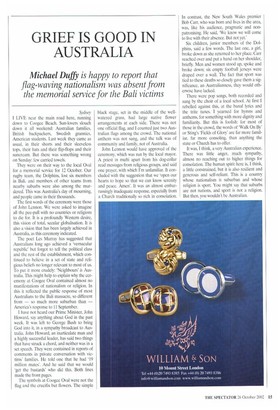GRIEF IS GOOD IN AUSTRALIA
Michael Duffy is happy to report that
flag-waving nationalism was absent from
the memorial service for the Bali victims
Sydney I LIVE near the main road here, running down to Coogee Beach. Sun-lovers slouch down it all weekend: Australian families, British backpackers, Swedish grannies, American students. Last week they came as usual, in their shorts and their sleeveless tops, their hats and their flip-flops and their suncream. But there was something wrong on Sunday: few carried towels.
They were on their way to the local Oval for a memorial service for 12 October. Our rugby team, the Dolphins, lost six members in Bali. and members of other teams from nearby suburbs were also among the murdered. This was Australia's day of mourning, and people came in their thousands.
The first words of the ceremony were those of John Lennon. We were asked to imagine all the pee-pull with no countries or religions to die for. It is a profoundly Western desire, this vision of total, secular globalisation. It is also a vision that has been largely achieved in Australia, as this ceremony indicated.
The poet Les Murray has suggested that
Australians long ago achieved a Vernacular republic' but forgot to tell the political class and the rest of the establishment, which continued to believe in a set of state and religious beliefs no longer relevant to most of us. To put it more crudely: 'Neighbours' is Australia. This might help to explain why the ceremony at Coogee Oval contained almost no manifestations of nationalism or religion. In this it reflected the public response of most Australians to the Bali massacre, so different from — so much more suburban than — America's response to 11 September.
I have not heard our Prime Minister, John Howard, say anything about God in the past week. It was left to George Bush to bring God into it, in a sympathy broadcast to Australia. John Howard, an inarticulate man and a highly successful leader, has said two things that have struck a chord, and neither was in a set speech. They were contained in reports of comments in private conversation with victims' families. He told one that he had '19 million mates'. And he said that we would 'get the bastards' who did this. Both lines made the front pages.
The symbols at Coogee Oval were not the flag and the crucifix but flowers. The simple
black stage, set in the middle of the wellwatered grass, had large native flower arrangements at each side. There was not one official flag, and I counted just two Australian flags among the crowd. The national anthem was not sung, and the talk was of community and family, not of Australia.
John Lennon would have approved of the ceremony, which was run by the local mayor. A priest in mufti apart from his dog-collar read messages from religious groups, and said one prayer, with which I'm unfamiliar. It concluded with the suggestion that we 'open our hearts to hope so that we can know serenity and peace. Amen'. It was an almost embarrassingly inadequate response, especially from a Church traditionally so rich in consolation. In contrast, the New South Wales premier Bob Carr, who was born and lives in the area, was, like his audience, pragmatic and nonpatronising. He said, 'We know we will come to live with their absence. But not yet.'
Six children, junior members of the Dolphins, said a few words. The last one, a girl, broke down as she returned to her place. Can reached over and put a hand on her shoulder, briefly. Men and women stood up, spoke and broke down; six empty football jerseys were draped over a wall. The fact that sport was tied to these deaths so closely gave them a significance, an Australianness, they would otherwise have lacked.
There were pop songs, both recorded and sung by the choir of a local school. At first I rebelled against this, at the banal lyrics and the trite tunes. I yearned for hymns and anthems, for something with more dignity and familiarity. But this is foolish: for most of those in the crowd, the words of 'Walk On By' or Sting's 'Fields of Gloty' are far more familiar, far more consoling, than anything the state or Church has to offer.
It was, I think, a very Australian experience. There was little anger, much sympathy, almost no reaching out to higher things for consolation. The human spirit here is, I think, a little constrained, but it is also resilient and generous and self-reliant. This is a country whose nationalism is suburban and whose religion is sport. You might say that suburbs are not nations, and sport is not a religion. But then, you wouldn't be Australian.


















































































 Previous page
Previous page